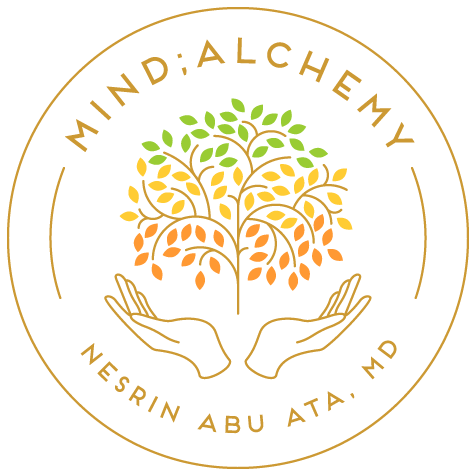QUESTION FROM A READER: I have been diagnosed with an anxiety disorder and I am interested in holistic tools and more natural medicines to manage my anxiety. What treatment options should I bring up with my mental health provider for my treatment for anxiety?
ANSWER: I am glad that you are being proactive about your mental health and looking at increasing the tools in your toolbox to manage anxiety and your overall mental health. With the pandemic, many people have been experiencing more anxiety. Anxiety affects 40 million adults in the US every year, making it one of the most common mental health conditions. Untreated anxiety can make it difficult to work, relax, get good sleep, and spend time with loved ones.
There are many different ways to manage the symptoms of anxiety. And it is important to consider combining different healing modalities, which is very unique to every individual.
Please note that the information below is for educational purposes only and is not providing medical advice. This information does not replace getting medical care. Please remember to always consult with your healthcare provider for your individual mental health treatment.
1. Managing life stressors and practicing self-care:
When you are anxious, your sympathetic system goes into overdrive. As a result, instead of slowing down and cutting back on to-do lists, the nervous system drives one to want to add more to his or her to-do list. Practice setting boundaries, saying no, and taking some time to rest. Practice good social media hygiene, which means limiting how much time you spend on social media.
2. Limiting caffeine intake:
While caffeine does not cause anxiety, it can worsen anxiety in someone who is prone to anxiety. Caffeine is a psychostimulant drug that affects the nervous system. It blocks a molecule called adenosine, causing the alertness associated with caffeine. Some side effects are nervousness, restlessness, fast heart rate, irritability, shakiness, and excitement. These side effects can start as soon as 45-60 minutes and last as long as 4-6 hours, or even longer depending on your metabolism rate.
3. Mind-body practices:
Mind-body practices include activities such as yoga, qi-gong, Tai Chi and meditation. These practices also include different forms of breathing that can activate the parasympathetic nervous system. Activating the parasympathetic system helps bring a sense of calm and feeling present, grounded, and connected. Some of the breathing techniques include unilateral and alternate nostril breathing, 4-4-6-2 breath, coherent breath/resonant breath, breath moving, resistance breathing and high frequency breathing (such as bhastrika breath and Kapalabjati breaths in yoga).
4. Herbs:
Do not take any herbs without consulting with your medical provider as they can potentially interact with other medications. As a result, they can affect certain body organs such as the liver. Herbs can come in the form of tinctures, teas or supplements.
This includes herbs that are known as adaptogens. Botanical adaptogens are plant extracts and constituents that increase the ability of an organism to tolerate, adapt, survive, and perform under a wide range of stressors. The term adaptogen was introduced In 1959 to describe substances that increase the ability of an organism to resist stress and mitigate the effects of environmental and emotional stress. Some examples include Rhodiola rosea, Schisandra chinesis, Eltherococcus senticosus (Siberian Ginseng) and Withania somnifera (Ashwagandha).
Other forms of herbs include Valerian root, lemon balm, passion flower, kava, ginkgo, and chamomile. It is important to let your mental health provider know if you are taking any of these herbs, as they have the potential to affect the liver and interact with the metabolism of other medications. Because these herbs help with anxiety, they can also cause sedation or sluggishness.
Lavandula angurtifolia (English lavendar) is recommended to be used in the form of aromatherapy, and not to be ingested. It is also not recommended to use in children or adolescent as it is considered a hormone disrupter and can affect children’s hormonal development.
5. Nutrients
This includes GABA, L-theanine, Omega three, L-lysine, L-arginine, Inotisol, Magnesium and Hydroxytryptophan (5-Htp).
Gamma amindobutyric acide (GABA) is a naturally occurring amino acid that works as a neurotransmitter in your brain. Neurotransmitters function as a chemical messenger in the brain. When GABA attaches to a protein in your brain known as a GABA receptor, it produces a calming effect. GABA is available in foods such as kimchi, miso, and tempeh.
L-theanine is a nonessential amino acid. It’s source is almost exclusively the tea plant Camellia Sinesis, also known as green tea. It is non sedating. It can be consumed as capsules or as green tea.
Omega 3 fatty acid is an anti-inflammatory. The brain is sensitive to general inflammation which can result in anxiety. When there is general inflammation in the body, the omega 3 levels can be low. Find Omega 3 fatty acid in fish or supplements.
L-lysine and L-arginine are essential amino acids that block receptors involved in the stress response. You will find L-arginine in red meat, poultry, fish, dairy products, nuts, sees, legumes and seaweed. L-lysine also is present in avocado, beets, leeks, tomatoes, pears, green and red peppers, pumpkin seeds, and quinoa.
Hydroxytryptopan (5-Htp) is an amino acid that is essential for manufacturing of serotonin in the brain. Serotonin is a neurotransmitter that plays a central role in regulation of mood and anxiety. It can be taken at bed time as it also can help improve sleep.
Inositol is a form of glucose that is present in the diet. It helps facilitate communication between brain cells. It can consumed as a supplement and is usually in a powder form
Magnesium is an essential mineral that the body uses to facilitate many biochemical reactions. There are different supplement forms, and each one has a potential side effect profile. It is important to consult with your mental health provider prior to taking this as a supplement to decide on the appropriate supplement.
Reference: Complementary and Integrative Treatments in Psychiatric Practice.

